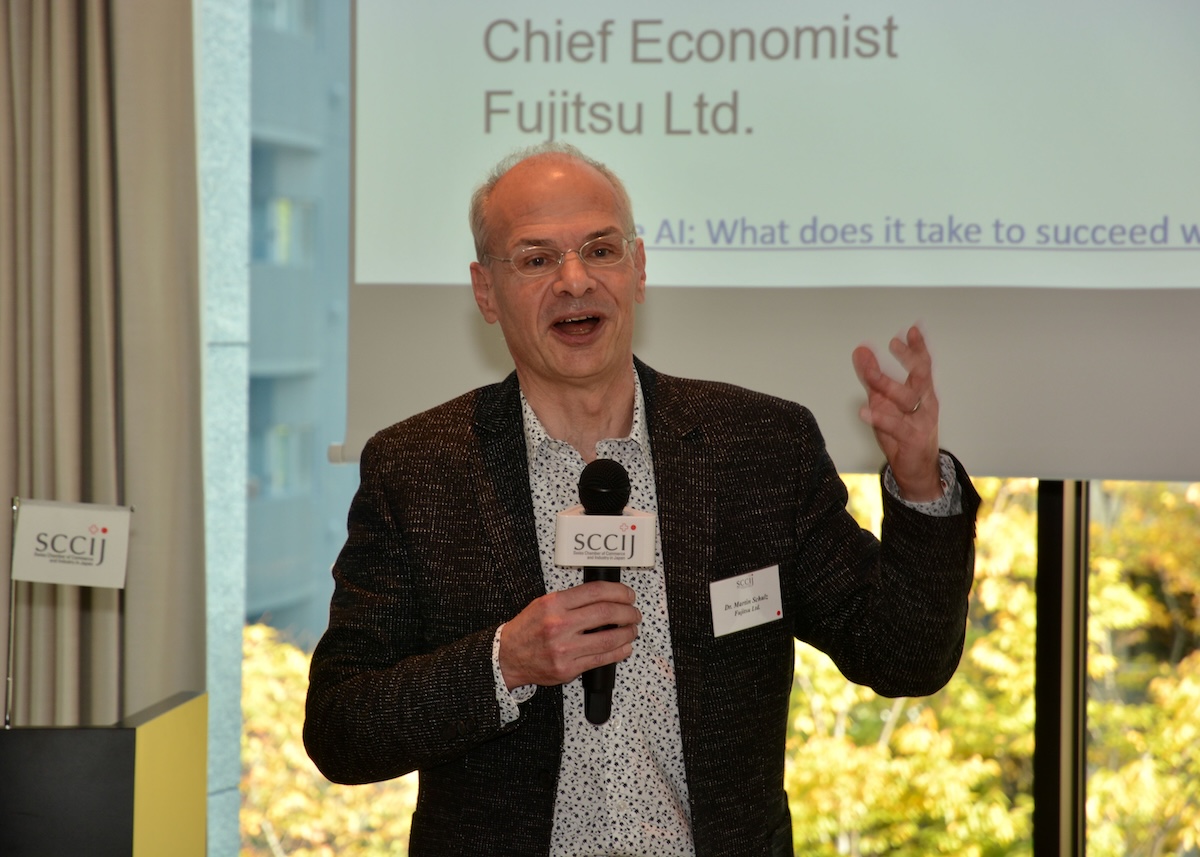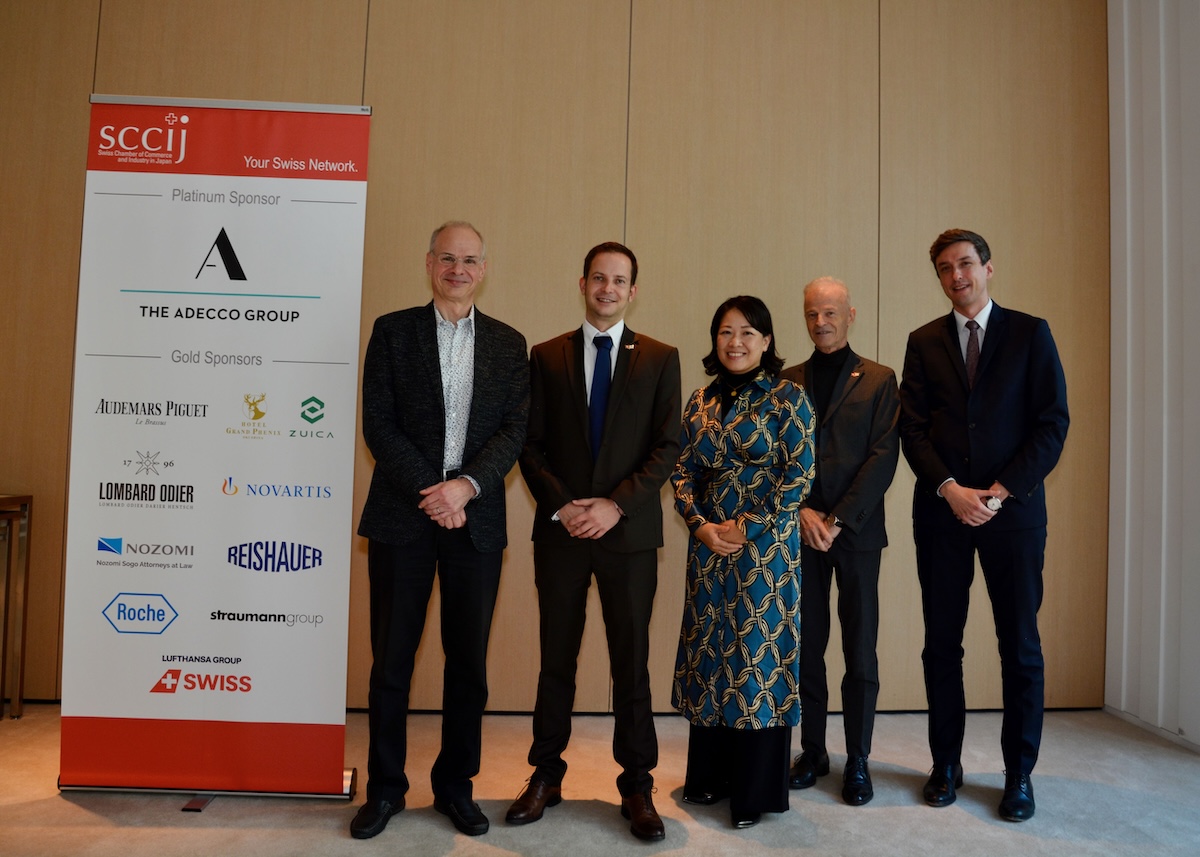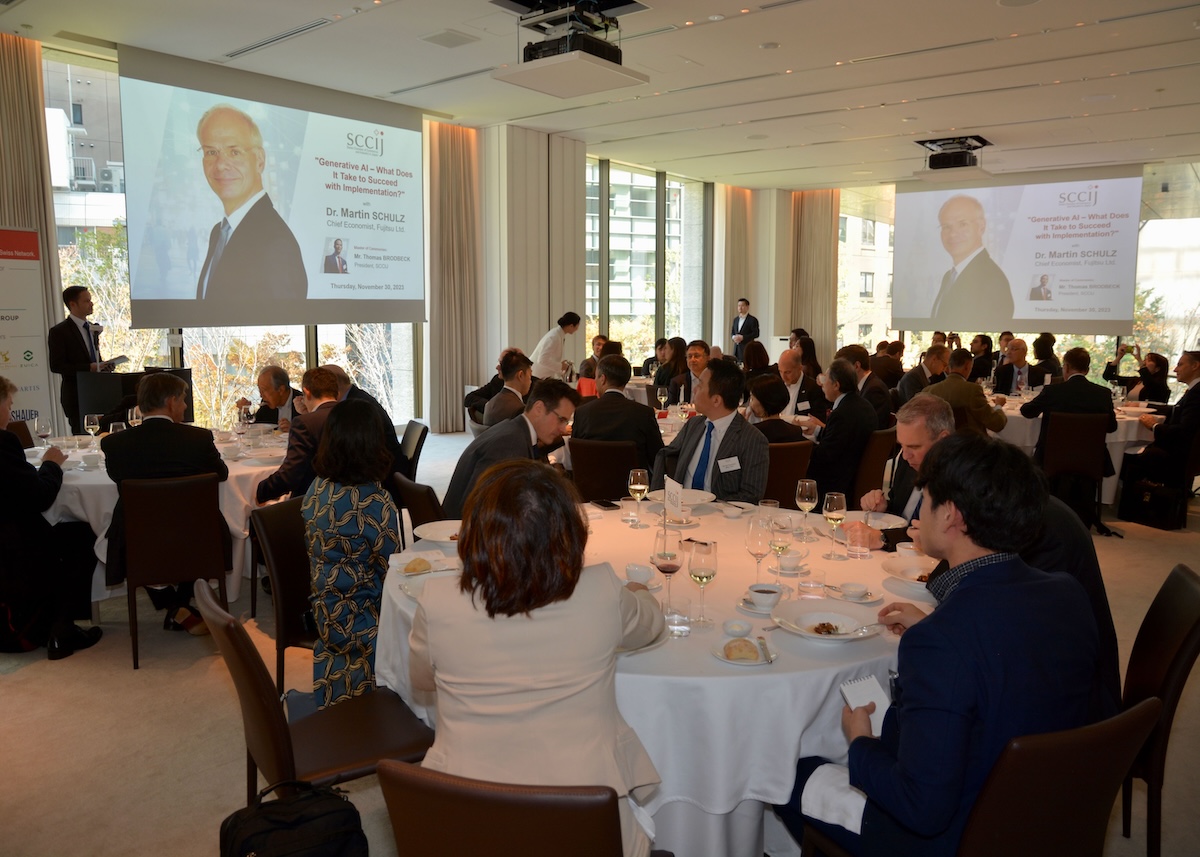Tokyo (SCCIJ) – Almost 60 SCCIJ members and guests attended our November Luncheon with Dr. Martin Schulz, Chief Economist of Fujitsu, who spoke about how to succeed with the implementation of generative AI in a company. He argued that business leaders must decide the role they want generative AI to play in their organizations and develop a coherent AI strategy. We summarize his talk in Q&A form.

November Luncheon speaker Dr. Martin Schulz, Chief Economist of Fujitsu, explained how to succeed with generative AI as a company.
With 1.5 billion users after one year, what are the reasons for the widespread appeal and potency of generative AI?
Martin Schulz: We can attribute this attraction to three features that set it apart from traditional AI systems. First, it possesses the ability to comprehend natural language, giving it access to any information published on the internet and making it accessible for seamless communication. Second, it can interact with users and generate various types of content on demand, including text, images, songs, code, and video clips. Lastly, it can learn and adapt skills through information and conversations in its environment. Such learning capacity, called emergence, already helps it to acquire new skills such as software engineering, that were not explicitly programmed into the model. This will provide entirely new opportunities for dynamic knowledge bases and management within organizations.
What are the challenges for business leaders in taking advantage of generative AI?
M. Schulz: In most cases, they will need to work with their IT departments to identify suitable development partners or prepare their companies for the data integration required for AI-based automation. They must consider which departments to empower for experimentation, ensuring swift adoption of reliable solutions. They need to support new skills such as “prompt engineering” and sufficient training for effective implementation. And they must lay the foundations for secure AI governance to mitigate risks.
But where are they supposed to start with the implementation?
M. Schulz: We suggest doing this in three stages. Start with experimentation. Encourage all your employees to play with Generative AI. Workers can utilize the “out-of-the-box” skills of AI without any coding knowledge, thereby enhancing their overall productivity. Just give them access to a secure, corporate version of this new tool. Most cloud services like Microsoft Office 365 have this option already integrated. Make sure that your company has a protected space to prevent information from leaking out.

Members and advisors of the SCCIJ Executive Committee with November Luncheon speaker Dr. Martin Schulz, Chief Economist of Fujitsu.
What can a company achieve with generative AI at this first stage?
M. Schulz: At this initial stage, the primary focus is on “augmented authoring,” which facilitates interactive searching, drafting, and editing of output from external sources. Marketing and sales teams have already reaped the benefits of such assistance. Generative AI’s capabilities as a virtual assistant for information retrieval, data analysis, documentation, and idea generation have proven valuable to entire R&D teams. In software development, certain planning and pre-coding tasks that previously took hours can now be accomplished in mere minutes.
Where do you see the limitations of this approach?
M. Schulz: Productive applications are currently limited to a few business functions. According to McKinsey’s 2023 research, approximately 75% of all productive uses are concentrated in R&D, software engineering, marketing/sales, and customer operations. Integrating productive AI into broader and more regulated business functions, such as finance, supply chain management, production, and planning, will necessitate carefully planned access to company data and the implementation of both existing and new fact-checking processes.
Where do you go from this experimentation level?
M. Schulz: The next level we call “automation”. It involves integrating these powerful models with company-specific datasets and operations to expand and automate existing business functions. For example, conversational models can be trained on a company’s customer service records, enabling them to handle customer complaints directly. By automating more business functions, generative AI contributes to increased revenue through enhanced efficiency, speed, and scalability of products and services.

The SCCIJ November Luncheon took place at the Tokyo Edition, Toranomon.
Should companies be content with the automation level or should they go further?
M. Schulz: To take full advantage of this powerful tool, we recommend advancing to the third stage. At this “discovery” level, generative AI becomes deeply ingrained within the enterprise. Through the use of specialized datasets, custom models, and company-specific fine-tuning, organizations can discover new knowledge and develop a dynamic knowledge base that directly supports strategic management and business model evolution.
What are the potential dangers and risks of introducing generative AI broadly?
M. Schulz: Since generative AI models learn from company data and employee interactions, they may inadvertently expose sensitive information in unexpected ways. Employee access to these models must be carefully managed according to their roles and functions within the company. Besides, companies should consider a “zero trust” security, which allows them to monitor and secure any device in the organization. Advanced, cloud-based data integration is becoming a must for AI applications.
How do you minimize the risk of “bad” results of a generative AI?
M. Schulz: Indeed, as models are vulnerable to revealing valuable information and protected
data when presented with clever, confusing prompts, e.g. by hackers, constant monitoring is essential. Furthermore, AI models can be biased and inaccurate if they rely solely on their data sources without incorporating additional ethical and fact-checking layers. Generative AI models amplify these risks, as they often generate unchecked responses from a vast array of unstructured internet content. Continuous development is crucial to mitigate even the most severe errors and “hallucinations.”
Learn more about Fujitsu’s insights into the implementation of Generative AI here.
About the speaker
Dr. Martin Schulz‘s work at Fujitsu focuses on the impact of digitalization, government policies, and corporate strategies. Before joining the Fujitsu Headquarters in 2020, Schulz was a research fellow at Fujitsu Research Institute, analyzing and consulting on the economics of technology. He teaches at the Mercator School of Management. His analyses are widely quoted in international media – with regular interviews at CNBC, Bloomberg, NHK World, and others.
Text and pictures: Martin Fritz for SCCIJ





























